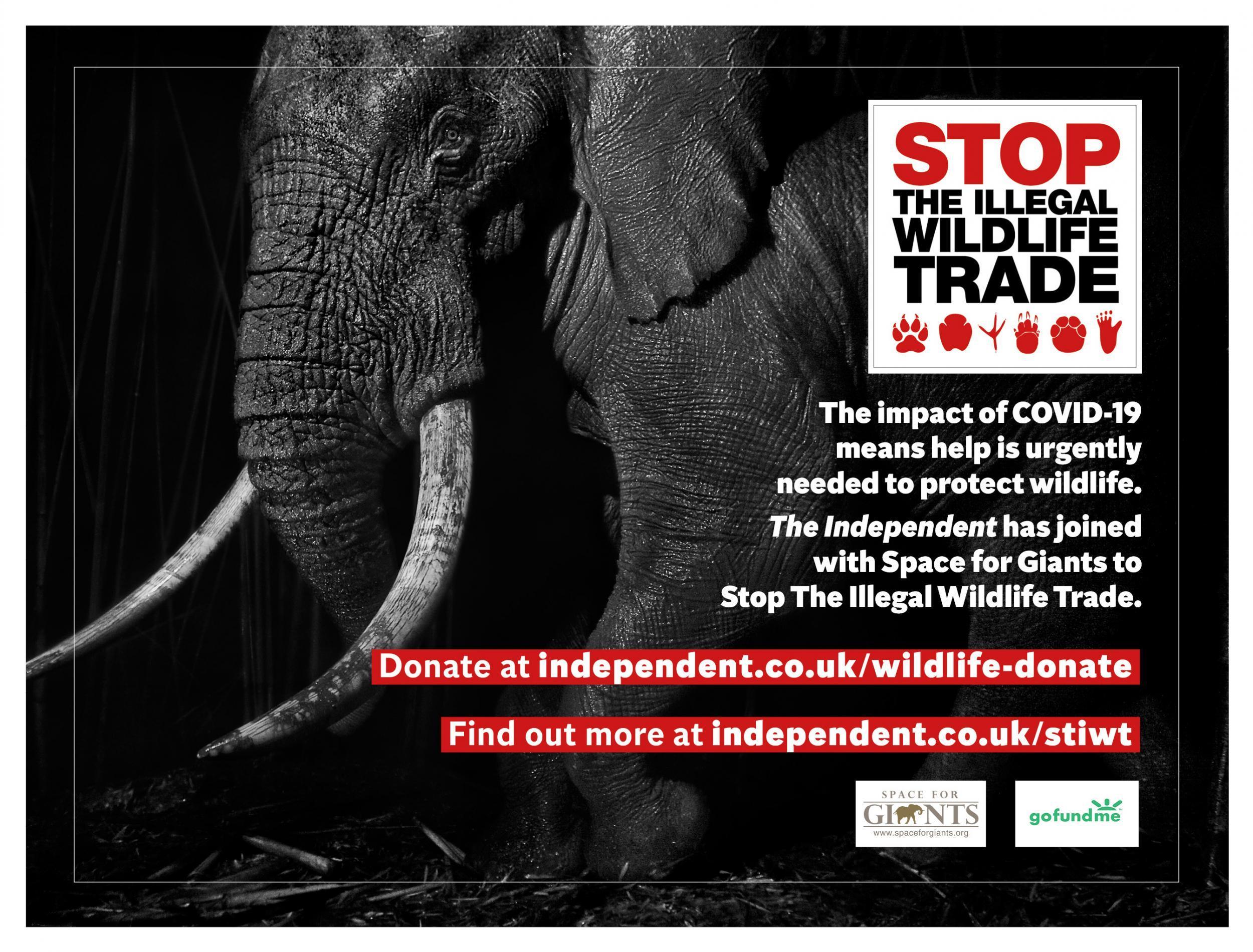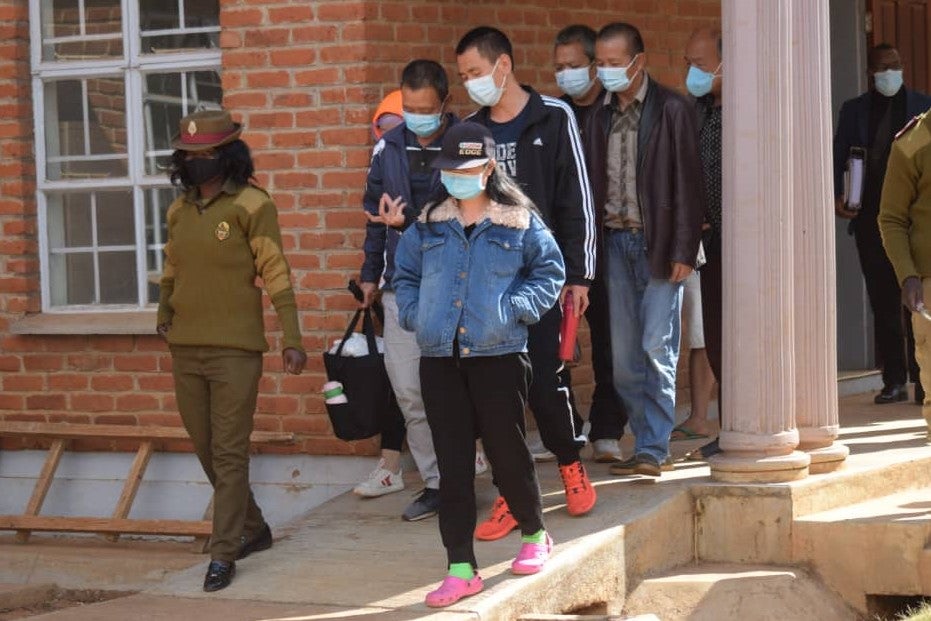Coronavirus has cut conservation back to its most basic function – and now even that is at risk
We are protecting wildlife at risk from poachers due to the conservation funding crisis caused by COVID-19. Help is desperately needed to support wildlife rangers, local communities and law enforcement personnel to prevent wildlife crime. Donate to help Stop the Illegal Wildlife Trade HERE

Your support helps us to tell the story
From reproductive rights to climate change to Big Tech, The Independent is on the ground when the story is developing. Whether it's investigating the financials of Elon Musk's pro-Trump PAC or producing our latest documentary, 'The A Word', which shines a light on the American women fighting for reproductive rights, we know how important it is to parse out the facts from the messaging.
At such a critical moment in US history, we need reporters on the ground. Your donation allows us to keep sending journalists to speak to both sides of the story.
The Independent is trusted by Americans across the entire political spectrum. And unlike many other quality news outlets, we choose not to lock Americans out of our reporting and analysis with paywalls. We believe quality journalism should be available to everyone, paid for by those who can afford it.
Your support makes all the difference.A welcome win in the fight against illegal wildlife trade took place in a court in Malawi this week, when seven Chinese nationals and two locals were sentenced to a total 56.5 years behind bars for wildlife crimes.
They were senior members of one of southern Africa’s most prolific international wildlife smuggling gangs, dubbed the Lin-Zhang syndicate after the husband and wife team that led it. They’d been found with rhino horn, elephant ivory, hippo teeth and pangolin scales, all most likely destined for Asian markets.
These sorts of prosecutions are increasing, but they are still rare. Take a moment to think of all the steps needed to reach this point: rangers needed training, equipping, and paying, to patrol the bush and get wind of the gang’s operations. Specialist investigators needed months to win the trust of informants. Police needed to run a delicate arrest operation, then gather evidence while guarding against corruption. Prosecutors needed watertight cases, and the magistrate needed to keep the trial moving and deliver an unimpeachable judgment.
Success against the international syndicates driving this vile business relies on this combined approach. It is central to the work of the organisation I lead, Space for Giants, which has partnered with the Independent and Evening Standard for the Stop The Illegal Wildlife Trade campaign.

But Covid-19 has cut wildlife and nature conservation back to only the most essential services: ranger patrolling to protect animals from poachers. Even that is at risk. We face a new conservation emergency if we don’t act now to keep up all the pressure we can against the illegal wildlife trade. In some cases, the gains of recent years could be lost in a matter of weeks.
I can completely understand if you think that now is the time to focus on human health and keeping people safe from the pandemic, rather than wildlife. However it is now excruciatingly clear that human health is intrinsically linked to the survival of wild species in their natural habitat.
It is the illegal wildlife trade, and humankind’s rapacious exploitation of nature, that delivered us diseases like Covid-19, Aids, SARS, and Ebola, killing millions of people, and, with the new coronavirus, brought the global economy to its knees. That makes stopping the illegal wildlife trade preventive health care for humanity’s survival.

Remarkably, to do that is both relatively straightforward and affordable, especially compared to what we’re spending now to keep Covid-wrecked businesses afloat. If one penny of every one of the £30bn that Europe’s airlines are receiving in taxpayer-funded bailouts was instead spent on stopping the illegal wildlife trade, we’d have the best possible health insurance against future pandemics.
How would we do this? Space for Giants, headquartered in Kenya and working in nine African countries, takes that combined approach that saw success in Malawi, to disrupt the supply side of the illegal wildlife trade. This is what your donation to this newspaper’s campaign will support.
What’s key is firstly training specialist ranger units that are mobile and work proactively, adapting the tactics of counter-terrorism to anti-poaching to hit the gangs before they strike. Ever-more boots on the ground won’t do it, especially when funding for that is drying up.
Targeted operations are the most cost-effective. The number of elephants poached where we work in north-central Kenya, where with partners we piloted this specialist approach, dropped from peaks of 100 in 2012 to zero in 2018 and three last year.
Secondly, we work to bring greater benefits to the people who live alongside wildlife. Conservation, and the tourism that funds so much of it, must make greater efforts to prioritise giving back. In Uganda, under the direction of President Yoweri Museveni, we’re bringing $61m of new conservation investment into critical protected areas, with strict plans for community and conservation dividends.
Finally, we work with national judiciaries to support their work to make legal action against suspected wildlife criminals stronger. Then the law will be the true, effective deterrent it should be. That means training for scenes of crime officers, investigators, prosecutors, and magistrates. It is this approach that has helped conviction rates in Kenya to increase from 24 per cent to more than 80 per cent.
Space for Giants is not alone. We work with a huge number of partner organisations and most importantly with the support and engagement of governments – often the heads of state – in all countries where we operate.
But all of this is at risk, because of the pandemic. We stand today at the brink of this new emergency, where the protectors of wildlife – from communities to rangers and prosecutors – no longer have the resources they need effectively to fight the illegal wildlife trade, reversing the gains made. We’re worried what will follow will be an onslaught against the remaining species of interest to the likes of the Lin-Zhang gang and their sadly many cohorts.
Only by acting now can we be sure that we did all we could to conserve a future for these natural landscapes and their wildlife, and by doing so, help to avert another global pandemic.
Dr Max Graham is founder and CEO of Space for Giants
Join our commenting forum
Join thought-provoking conversations, follow other Independent readers and see their replies
Comments